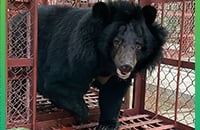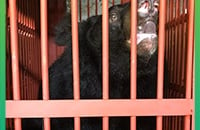Bear bile harmful to human health, according to research released at major Beijing event
08 January 2012
The Chinese pharmaceutical industry was today called on to stop producing, promoting and selling bear bile from farmed bears at a high profile event in Beijing.
The Healing Without Harm campaign launched by Animals Asia, an organisation that rescues bears from bile farms in China and Vietnam, included talks from a range of experts who presented research showing that bear bile extracted from farmed bears should be considered unsafe, and that bear farming causes great cruelty to farmed bears.
Professor Jiang Qi, ex-vice president of the Shenyang Pharmaceutical University and deputy chief of the synthetic bear bile research institution, produced research results showing that synthetic bile produced by his team contained 40 percent ursodeoxycholic acid (UCDA), the active ingredient in bear bile that is known to have healing properties. Bile extracted from bears contained only 23 percent UDCA.
Professor Gao Yimin, an ex-member of the New Drug Evaluation Committee of China’s Health Ministry, a well-known Traditional Chinese Medicine (TCM) practitioner, spoke at the event calling on TCM practitioners to adopt synthetic substitutes in place of endangered animal products.
Toby Zhang, Director of External Affairs in China, Animals Asia commented:
“Traditional Chinese Medicine has been practiced in China for thousands of years. It is a broad and profound science. Being harmonious with nature is a consistent theory that TCM has always stuck to. Using bear bile products produced by the bear farming industry obviously violates the harmonious spirit of the TCM, by not only causing unbearable suffering to the animals, but also threatening the health of those who consume them.”
Other research included a study conducted by the General Hospital of Chengdu Military Command on farmed bear specimens provided by Animals Asia’s China Moon Bear Rescue Centre. Dr. Wang Shengxian, the Head of Pathology at the hospital, concluded that 100 percent of the specimens were found to have inflammation of the hepatic and cholalic system. This suggests that bile extracted from live bears may contain hepatic carcinoma and inflammatory cells and consequent cytokine, which is harmful to human health.
Of the bears that have died in the rescue centre, 38 percent were killed by cancer, which is thought to be caused by the bile extraction process. During extraction, bears are given large amounts of antibiotics to control inflammation, and it is considered likely that residual amounts remain in bear bile products. These could also be harmful to the health of consumers of farmed bear bile.
In light of the potential public safety issues associated with extracted bear bile, 40 drug shops in the cities of Shenyang and Chengdu have pledged to stop selling bear bile. Mr. Li Jianyu, General Manger of Liaoning Kangbo Tian Tian Hao Drug Shop Company, said on behalf of the 40 drug shops that their decision was made to ensure the absolute safety of their customers, and fulfil their responsibilities to society and nature. He hopes more enterprises join this programme.
Dr Jill Robinson MBE, Founder and CEO of Animals Asia commented:
“We are reassured and immensely grateful to hear a wider community of traditional Chinese medicine practitioners coming down hard on bear farming today. The truth of the bears physical and psychological suffering is becoming more widely known, together with the obvious conclusion that the consumption of their diseased and contaminated bile cannot possibly be good for human health, and for the reputation of such a respected discipline of medicine. We offer any and all help to the authorities in their escalation of "greening" China and in closing an industry that has proven so damaging to the health and mortality of one of its flagship endangered species.”
As many as 20,000 bears across Asia are farmed for their bile, which is used in traditional Asian medicine despite the availability of over 54 inexpensive herbal and synthetic alternatives. In China, the bears can spend more than 30 years in tiny cages and are milked regularly for their bile through crude catheters or permanently open holes in their abdomens. According to official figures there are more than 7,000 bears on farms, but Animals Asia fears the actual figure could be higher than 10,000.
BACK




 Freedom after two decades: Moon bears Nang and Mua rescued
Freedom after two decades: Moon bears Nang and Mua rescued
 With heavy hearts we say goodbye to our beloved Tulip
With heavy hearts we say goodbye to our beloved Tulip
 Three moon bears rescued from notorious bear bile farming hotspots in Vietnam
Three moon bears rescued from notorious bear bile farming hotspots in Vietnam